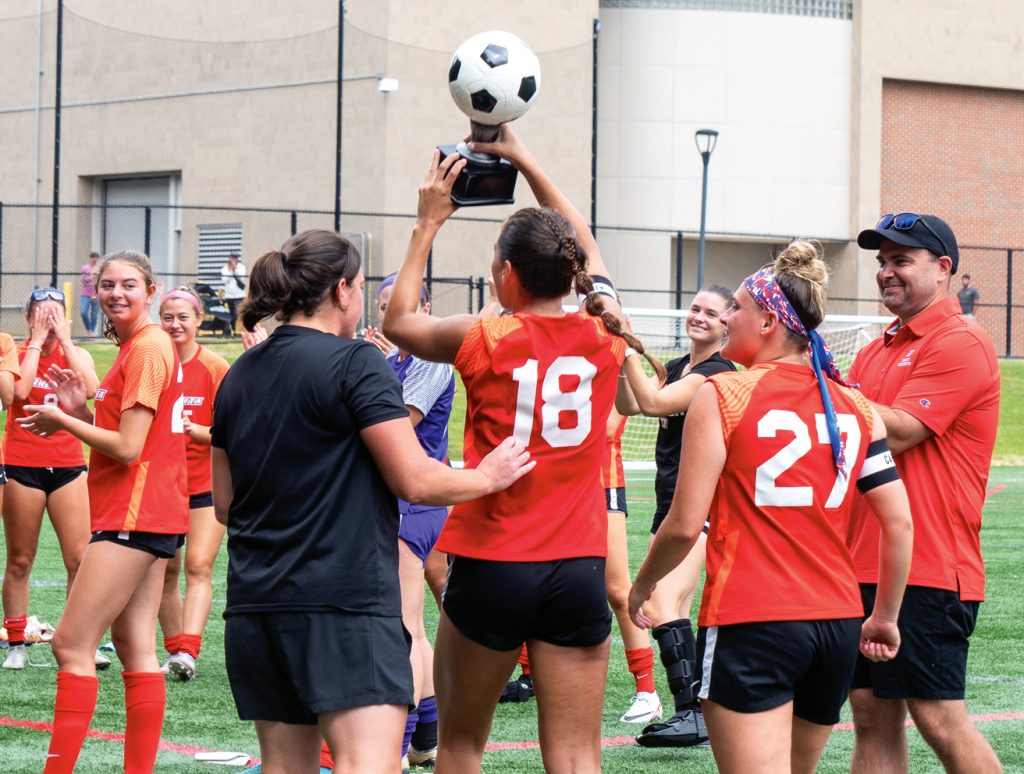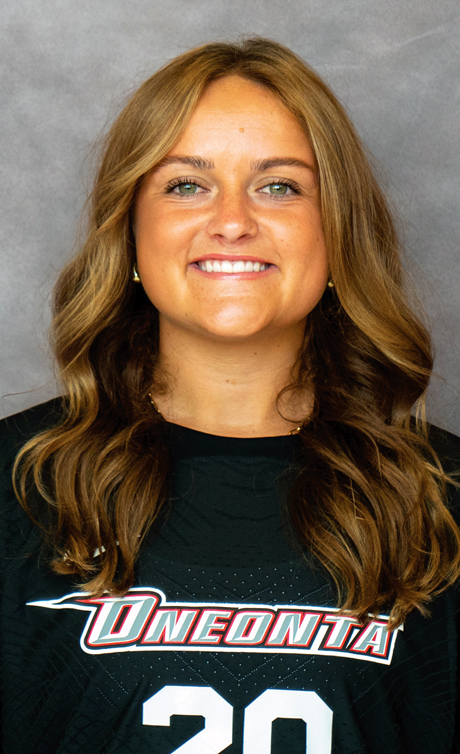
Angellotti Working To Elevate Performance On, Off the Field

(Photo provided)
By EVA PICKERT
ONEONTA
In the fast-paced world of collegiate athletics, where wins and losses can define seasons, evidence shows that the mental well-being of athletes is just as important as their physical training. At SUNY Oneonta, the women’s soccer team started using unique strategies to enhance their performance, all thanks to the guidance of Chad Angellotti, the team’s mental health coach. Angellotti has been coaching the Oneonta women’s soccer team for the last two years, gradually enhancing exercise routines for the athletes by incorporating self-reflection and visualization after each practice.
Senior leader Kennady Amo explained how mental coaching enhanced the team’s style of play.
“Every Monday session we are able to get together as a team and talk about our strengths and weaknesses. This allows us to grow as individuals as well as a team,” she said. “We are able to learn from our experiences and improve them for our next session or game.”
Mental health support has been traditionally underemphasized in sports, which often focus on physical performance and technical skills. As Oneonta’s mental health coach, Angellotti addresses critical aspects of health, such as stress management and performance anxiety, and offers a holistic approach to the development of each individual athlete.
Angellotti’s career includes 15 years of mental health research and practice with athletes. He has since enriched his expertise with new strategies like breath work and meditation techniques which aim to enhance the athletes’ mental performance.
“We talk about the physical aspects of training all the time, but mental preparation is just as crucial,” Angellotti said. “In soccer, 90 percent of the game is mental. It’s about how you react to pressure, how you stay focused, and how you recover after a mistake. We emphasize that recovery—both physical and mental—is just as important as performance.”
After working with Angellotti, the SUNY Oneonta women’s soccer team has visibly improved its performance. This year, the team was able to succeed all the way to the semifinals in the SUNYAC. The athletes attribute their success to mental well-being, among other factors.
Angellotti’s role transcends the typical expectations of sports psychology, blending his clinical expertise with a deep understanding of athletic performance. His approach to mental health is woven into the team’s regular training schedule, with sessions such as “Mental Performance Mondays:” Every Monday after practice, Angellotti sits down with the team to talk about recent stresses and coping methods. He recaps the previous weekend games while getting the athletes mentally prepared with mindfulness work toward the upcoming practice or games for the rest of the week.
Angellotti employs a range of techniques designed to help athletes manage the pressures of stress. One of the most powerful strategies he encourages is self-reflection. During one session, Angellotti had athletes fill out a document of questions that asks players about how they feel they performed that practice, having them write down things they felt they did or did not do well. This method allows athletes to reflect back on their play during that day, so they can come into the next session knowing what they need to work on.
Amo said, “Self reflections help me acknowledge my weaknesses, which allows me to set goals for next sessions where I can improve my play.”
“The key is helping athletes develop the ability to control their controllables,” Angellotti explained. “I teach them to detach from the outcome. It’s about staying in the moment.”
One of the most important elements of Angelotti’s coaching philosophy is his “non-pushy” approach.
“I’m not going to chase you,” he tells the players.
He said he does this to ensure athletes know there is no pressure, but they can reach out to him when needed.
“I always let the players know that I’m here for them,” Angellotti explained. “Whether it’s before a game, after a loss, or even in their personal lives, they know they can reach out whenever they need it.”
Amo said Angellotti’s mental health coaching has made a profound impact on both her individual performance and the team’s overall well-being.
“I can honestly say that Chad has been a game-changer for us,” said Amo, who has been with the team for all four years of her collegiate career. “The mental aspect of soccer is just as important as the physical side, and Chad really helps us understand how to manage that pressure. We’ve seen a huge improvement in how we handle stress and stay connected as a team.”
Amo explained that Angellotti’s strategies have instilled a new sense of resilience within the team.
“Chad’s sessions, especially ‘Mental Performance Mondays,’ have really helped us get on the same page mentally, which has made a huge difference when we face tough opponents,” she said.
Amo emphasized that one of the most powerful aspects of Angellotti’s approach is the way he encourages self-reflection and personal growth.
“Chad implements the importance of being a better person to become a better athlete,” she said. “He provides us with self-reflection documents after games that scrutinize our performance in the physical and mental aspects of the game. This has been a game changer in our style of play and mental performance on and off the field.”
Looking ahead, Angellotti says he has ambitious goals for expanding mental-health resources within all athletic departments at SUNY Oneonta. He hopes for a future full-time role as a director of athletic mental health, a position that would allow him to provide more one-on-one sessions with athletes in all sports.
Angellotti is particularly focused on reducing athlete attrition by providing better mental health support.
“Mental health is often overlooked in sports,” he said. “But if we don’t address it, athletes burn out or even leave the sport.”
Haley Saunders is an advanced journalism student at SUNY Oneonta.

